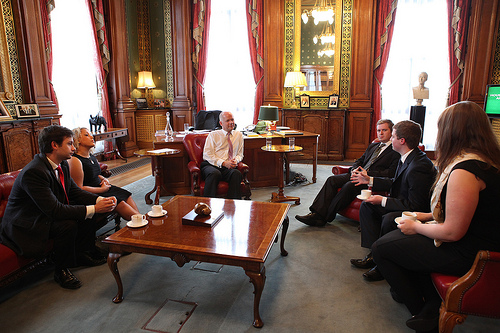24th December 2012 London, UK
A year of digital diplomacy

As we get to the final few days of 2012 it is also my final few days working at the Foreign Office. On the day I joined in 2008, the Foreign Office had one twitter account (@foreignoffice) with 40 followers. Now we have over 150 twitter accounts – including six FCO Ministers – and hundreds of other social media accounts on a variety of platforms.
It’s been an incredible four years working in the team and watching the growth of social media and digital diplomacy. Here are some of the social media highlights from the Foreign Office and its network of British embassies, high commissions and missions overseas during 2012 – a remarkable year for the UK.
Anniversary of the Arab Spring
To mark the first anniversary, the FCO told the story of the Arab Spring from the UK’s perspective. We tracked some of our key diplomatic action, consular assistance, speeches, statements, blogs, visits, upscaling of the Arab Partnership and project milestones. The timeline was viewed over 10,000 times.
Foreign Secretary on Twitter
Foreign Secretary William Hague has used his Twitter account throughout the year to allow people to ask him live and direct questions on British foreign policy, using the hashtag #askFS. The Foreign Secretary’s live hour-long Twitter on Syria Q&A attracted over 50 questions on the humanitarian situation, diplomacy with Russia and China, justice and accountability and next steps.
In September, Twitter not only offered the opportunity to engage with the Foreign Secretary but to meet him in person for a discussion. To mark reaching 100,000 followers the Foreign Secretary invited his followers to tweet using the hashtag #meetFS. Five followers that had tweeted using the hashtag were then invited to the Foreign Office to continue a discussion on foreign policy in person.

London Conference on Somalia
 On 23 February senior representatives from over 50 governments and multi-lateral organisations came together in London with the aim of delivering a new international approach to Somalia. The FCO provided digital coverage of the conference and an opportunity for Somalis within Somalia and members of the Somali Diaspora to engage with Government.
On 23 February senior representatives from over 50 governments and multi-lateral organisations came together in London with the aim of delivering a new international approach to Somalia. The FCO provided digital coverage of the conference and an opportunity for Somalis within Somalia and members of the Somali Diaspora to engage with Government.
Ahead of the conference, the UK Ambassador to Somalia wrote a blog setting out the aims and objectives of the conference. The blog received over 1000 comments, and provided a platform for debate.
The conference was covered via Storify, which we encouraged others to embed onto their news sites. It was viewed over 260,000 times, with more than half these views coming from the Alshahid website in Somalia. Videos from the conference on YouTube received over 240,000 views.
#OurManIn
In March this year, Channel 4 ran a documentary series following British consular staff in Spain called “Our Man In”.
To build on the interest of the issues raised by the documentary, we tweeted along with the TV show from the FCO’s consular Twitter channel, @fcotravel, using the hashtag promoted by the show, #OurManIn. This enabled us to join in the conversation and tweet key information and links to our travel advice.
Diamond Jubilee on Pinterest
Her Majesty The Queen’s Diamond Jubilee was one of the reasons to celebrate the year 2012. To bring together the incredible images and videos from the celebrations in our embassies and high commissions, we created our first Pinterest board.
London 2012
The UK welcomed the world to the London 2012 Olympic and Paralympic Games this summer – and we welcomed them with a YouTube video in several different languages.
The FCO’s network worked hard before, during and after the games to provide digital content for the world’s first digital games. Content was aggregated on Pinterest, and the FCO’s London 2012 Storify, providing a snapshot of London 2012 activity in the UK for an overseas audience.
Google Hangout
On November 1st, British Ambassador to Lebanon Tom Fletcher took part in the FCO’s first live Google+ Hangout. He was interviewed on Syria and its impact on Lebanon by Syria Deeply (a single topic news website). To encourage non G+ users to get involved, questions were collated through both the G+ hangout event page and Twitter, and the event was live streamed on YouTube. It has received more than 600 views since it was aired.
Remembrance Day 2012
To mark Remembrance Day this year the FCO tweeted simultaneously at 1100 GMT on Sunday 11 November from over 100 twitter accounts. Our social media channels also observed a one hour “social media silence” to respect the fallen.
We created a story on Storify to curate content from around our network showing the different ways in which the date is marked around the world.
Each year the Foreign Secretary lays a wreath at the Cenotaph which represents the UK’s Overseas Territories, and is made each year by the Royal Botanic Gardens, Kew. We published a photo story explaining the significance of the different plants used to make up the wreath.
Next year, the digital team will be looking to implement the Foreign Office’s new and ambitious Digital Strategy. I wish all my colleagues the very best as they begin the exciting challenge to embed a “digital as default” ethos across the entire organisation – putting digital at the very centre of UK diplomacy and foreign policy.
Hi Zoe, thanks for your comments! We actively encourage FCO staff to use social media as part of their everyday work where it can add value. This means thinking about digital as a core part of any communications strategy, and also for monitoring subject areas and for crisis situations. You can take a look at our case studies (digital.fco.gov.uk/case-studies/) to see how staff have used digital. Our new social media guidelines have been published (digital.fco.gov.uk/social-media-policy/) which we hope will empower and encourage even more people across the organisation to use social media to achieve their foreign policy goals.
Thanks for sharing your experiences and highlights of 2012. What a great year of digital comms for the foreign office! I particularly liked your use of Storify and Google+. Can you share how you activated so many employees socially?